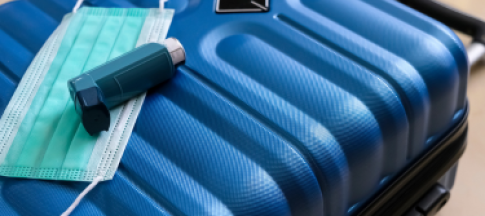
It’s always exciting heading off on holiday. But if you have epilepsy, you may have a few extra worries about travelling.
Don’t worry – your epilepsy doesn’t need to hold you back! We cover how to travel safely with your condition, and how travel insurance can help.
Why do people with epilepsy need travel insurance?
Lots of people live with epilepsy and rarely have seizures but if you do, they can be dangerous.
Unfortunately, epileptic seizures can happen in any place at any time – including when you’re on holiday.
Unlike when you’re in the UK using the NHS, getting emergency medical care abroad can be expensive.
This is where travel insurance can help.
What does travel insurance for epilepsy cover?
If you have an epileptic seizure abroad and need emergency medical care, travel insurance can help cover the cost.
Travel insurance can also help with:
- the cost of bringing you home if a medical professional says you need to – this is called repatriation
- any lost, stolen or accidentally damaged medication – like your epilepsy medication
- if you need to cancel or cut your trip short because of your epilepsy
Don’t forget, limits and exclusions always apply here!
How to stay safe on holiday with epilepsy
Have a safe and memorable holiday with these tips.
Set medication reminders
The excitement of a holiday can make it easy to forget about the little things, including taking your medication.
But remember, missing doses of epilepsy medication can increase the risk of a seizure.
Make sure you’re taking the right dose at the right time. Set reminders on your phone or have a loved one set them for you.
Check where the nearest hospital is
In case the worst happens, check where your nearest hospital is and how to get there.
You can also check out local taxi companies if you don’t have private transport already.
Look after yourself
Keeping your health in check on holiday can help keep you safe. During your trip, make sure you:
- get enough sleep every night
- avoid large amounts of caffeine or alcohol
- stay away from very hot areas
- avoid highly stressful situations where you can
What to do before your trip
Before you jet off, make sure you’ve crossed a few things off your list.
Chat to a medical professional before you go
It’s always best to talk to a medical professional about your epilepsy before you head off on your trip. They can give you advice on how to keep yourself healthy and what to watch out for on your trip.
Pack enough medication for your whole trip
If you take medication for your epilepsy, make sure you pack enough for your entire trip. That includes for your journey there and back.
It’s also best to pack a few spare doses in case you run into any travel delays.
Check the medication laws for where you’re going
Different countries have different laws around bringing medication in.
Check the rules around your specific medication where you’re going so you know you can bring it with you.
Can I fly with epilepsy?
Yes, you can fly with epilepsy. But just like anywhere else, there is the risk of having an epileptic seizure during your flight.
To be prepared and stay safe, you should:
- chat to your airline at least a few days before you’re scheduled to fly
- talk to a medical professional about flying with epilepsy, especially if you have seizures regularly
- make sure you’ve packed enough medication for your journey, especially if it’s a long flight
Is epilepsy a pre-existing condition?
Yes, most insurers consider epilepsy a pre-existing medical condition.
We define a pre-existing medical condition as an illness or injury that:
- has been identified by a medical professional
- is under investigation by a medical professional
- existed at any time before your policy starts or when you booked a trip - whichever is later
Do I have to declare my epilepsy when buying travel insurance?
Yes. It’s really important that you tell your insurer about your epilepsy.
If you don’t, you probably won’t be able to claim for anything related to your epilepsy on your trip. In fact, you might not be able to claim for unrelated reasons either, so keep this in mind.
Does a Global Health Insurance Card (GHIC) cover my epilepsy?
Yes. A GHIC can help with medical costs in certain countries if you have epilepsy.
The point of these cards is to get you cheaper medical care abroad, or sometimes even for free.
Your GHIC can be used when you’re visiting certain EU and non-EU countries. Head to the official NHS webpage for a full list of these.
Read our guide on how and where you can use the GHIC or EHIC.
Don’t forget that the GHIC doesn’t cover costs outside of medical care, like coming home early because of your epilepsy or travel disruption.
What should I do if I get ill while I’m abroad?
If it’s urgent, call the emergency services or go to the nearest hospital.
You should call us if you’re going into hospital or your medical costs are likely to be over £500, so we can help you.
Call your insurer’s emergency service or helpline as soon as possible. If you’re with us, our 24-hour emergency helpline is +44(0)292 010 7777. You need to call within 24 hours of your medical emergency.
MoneyHelper Directory
If we can’t cover your medical condition, you can use the MoneyHelper directory to find a specialist insurer who might be able to cover you if you’ve been:
- refused travel insurance or had your policy cancelled
- offered cover with a medical exclusion that you can’t remove from your policy
- given a price for a travel insurance policy with high medical costs
MoneyHelper makes it easier to find and compare policies you can afford that cover your condition and medical needs.
Use the MoneyHelper directory online or call MoneyHelper on 0800 138 7777. Phone lines are open Monday to Friday, 8:00am to 6:00pm, excluding bank holidays.


